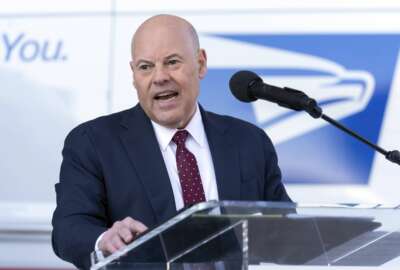
Working Sundays at USPS? Former mail carrier tells SCOTUS that’s against his religion
A former mail carrier is telling the Supreme Court the Postal Service didn’t go far enough to accommodate his religious beliefs when it scheduled him to work ...
A former mail carrier is telling the Supreme Court the Postal Service didn’t go far enough to accommodate his religious beliefs when it scheduled him to work Sundays.
In a filing before the Supreme Court this week, legal counsel for Gerald Groff, a former rural carrier in Lancaster County, Pennsylvania, argued USPS failed to demonstrate that meeting his religious accommodation not to work on Sundays was an “undue burden” on the agency.
Groff’s attorneys describe him as an “Evangelical Christian who observes a Sunday Sabbath, believing that day is meant for worship and rest.”
The Supreme Court is scheduled to hear oral arguments in the case, Groff v. DeJoy, on April 18.
The 1964 Civil Rights Act prohibits an employer from discriminating against an individual because of an individual’s religion.
More broadly, however, the Supreme Court is expected to decide whether employers should have to prove “more than a de minimis cost” to demonstrate that religious accommodation would be an “undue hardship” for its business.
Groff’s attorneys argue that the current de minimis standard “effectively nullifies the statute’s promise of a workplace free from religious discrimination.”
Instead, Groff’s attorneys argue that employers should face a higher bar for not accommodating an employee’s religious beliefs, and that employers should only be able to claim an undue burden if a religious accommodation requires “significant difficulty or expense.”
The Supreme Court will also have to determine if USPS sufficiently demonstrated an undue burden in this case by showing Groff’s requested accommodation shifted more work onto Groff’s coworkers.
Attorneys for Groff argue that USPS, in lower court rulings, acknowledged that exempting him from Sunday delivery “would impose no meaningful burden on USPS,” but argued the accommodation would require his coworkers to cover more Sunday shifts.
Groff’s attorneys argue a federal appeal court incorrectly ruled in favor of USPS, because it failed to demonstrate an undue hardship “on the conduct of the employer’s business, and instead accepted that the requested accommodation would burden the employee’s co-workers.”
Groff resigned from his job as a rural carrier assistant in January 2019, several years after USPS management disciplined him for not showing up for his scheduled shifts on Sundays.
USPS told the U.S. District Court for the Eastern District of Pennsylvania that Groff “never worked on a Sunday, even if he was scheduled.”
USPS said Groff didn’t report to work for 24 scheduled Sundays, and management wasn’t able to find someone to cover those shifts. Management issued Groff a letter of warning in June 2017, after not showing up for six scheduled Sunday shifts. He later received a 14-day suspension in October 2018.
USPS first hired Groff in 2010 as a temporary relief carrier, a part-time, non-career position that covers routes when full-time career mail carriers are absent.
He left the job in October 2011 but was re-hired by USPS in April 2012. Later that year, he became a rural carrier associate (RCA) — another part-time role that covers for regular carriers.
“RCAs are neither guaranteed specific hours or set schedules,” Brian Hess, postmaster of the Holtwood, Pennsylvania post office, wrote in a 2020 court filing. “RCAs are not guaranteed specific hours or set schedules. They are scheduled on an as-needed basis.”
USPS in 2013 reached a deal with Amazon to deliver packages on Sundays. USPS told the lower courts that its finances had been “steadily worsening,” and that the agency had reported a record $16 billion net loss in 2012.
The National Rural Letter Carriers’ Association signed a memorandum of understanding (MOU) in May 2016 requiring all RCAs to be available to work Sundays and deliver Amazon packages.
The union, per the memo, created a list of its members who volunteered to work Sundays and those who did not.
On any given Sunday or holiday, management determines how many carriers are necessary, given the expected mail volume. Post office managers must first call in carriers on the volunteer list to work Sundays, but they can also require non-volunteer carriers to work Sundays if they’re still short-staffed.
Groff, prior to the MOU, negotiated with his postmaster at the Quarryville post office to be exempt from working Sundays. After the MOU, however, the postmaster told Groff that she would no longer be able to exempt him from Sunday work.
USPS said in its filing that Groff didn’t file any grievance or employment discrimination complaint, but instead voluntarily transferred to the Holtwood station, a smaller post office that was not yet assigned Sunday delivery work for carriers.
“No one ever promised the plaintiff that the Holtwood station would continue to be so exempt or that he specifically would be exempt from delivering Sunday,” USPS wrote.
In March 2017, Holtwood station became part of Amazon Sunday delivery. At the time Groff told Hess his “intent to resign rather than be assigned to work Sundays.”
USPS management suggested several accommodations — including having Groff work Sundays after church, or allowing Groff to have another day during the week as a day of worship, if he was scheduled to work Sunday.
Post office management also offered to contact carriers from nearby post offices to cover for Groff, if he was scheduled to work Sundays.
“The plaintiff rejected all offers made by management. He hoped the USPS would create a position for him that did not require work on Sundays,” USPS wrote.
USPS asked Groff to submit a letter from his church to explain his request for an accommodation. The agency said Groff instead sent an unsigned letter he had written.
USPS notes it had difficulty getting carriers to work on Sundays, and that many RCAs resigned. When Groff did not show up on his scheduled Sunday shifts, USPS said it led to scheduling problems, overtime and other carriers working more Sundays than they otherwise would have to.
“When the plaintiff was scheduled and did not work, it upset the other carriers,” the agency told lower courts.
Groff filed his first Equal Employment Opportunity complaint in September 2017, alleging religious discrimination because he had been issued a letter of warning for missing his scheduled Sunday shifts.
“The plaintiff did not spend the whole day in church on Sundays,” USPS wrote. “The plaintiff watched NASCAR on Sunday.”
Groff has the support of others claiming religious discrimination in federal hiring.
Jeffery Podell, a Jewish job applicant suing the Defense Department for allegedly not accommodating this request to take a pre-employment test on any other day than Saturday, filed an amicus brief on behalf of Groff — along with the Rieders Foundation, a Jewish human rights group.
In their amicus brief, Podell and the Rieders Foundation said “USPS failed to demonstrate that accommodating Groff would cause undue hardship.”
“Groff’s absences had a minimal impact on USPS’s business, if any. USPS fulfilled its contract with Amazon, and no packages went undelivered due to Groff’s absences,” the brief states.
The amicus brief says federal law requires an employer to “reasonably accommodate” an employee’s religious observances, practices and beliefs, unless the employer can show that accommodation would cause an “undue hardship” to the employer’s business.
“In some cases, accommodation may not be possible. However, the employer bears the burden of demonstrating that a serious attempt to accommodate the employee was made,” the brief states. “Neither statutes nor the courts have clearly defined undue hardship.”
Copyright © 2024 Federal News Network. All rights reserved. This website is not intended for users located within the European Economic Area.
Jory Heckman is a reporter at Federal News Network covering U.S. Postal Service, IRS, big data and technology issues.
Follow @jheckmanWFED
Related Stories





